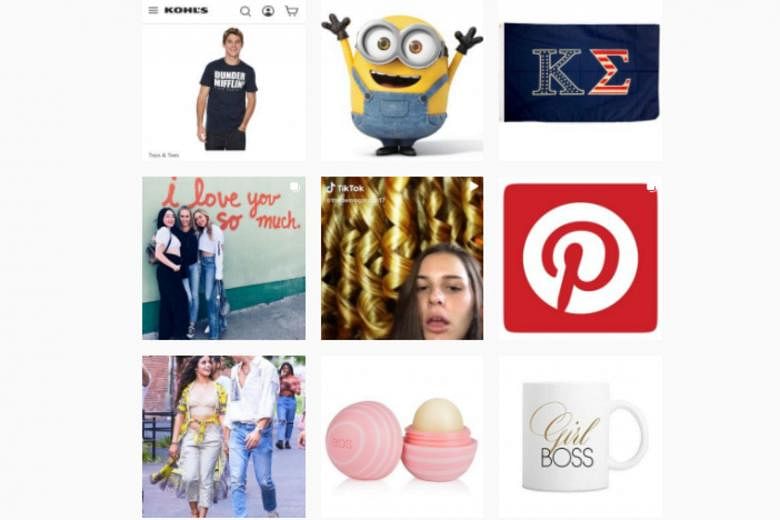NEW YORK (NYTIMES) - "OK TikTok, I have a new word for you that my friends and I use that you clearly are all in need of," Ms Hallie Cain, 24, a copywriter in Los Angeles says in a TikTok posted on March 30.
In the video, she gestures to another video of a girl who is describing "the type of people who get married at 20 years old" or have millennial "girlboss energy" and who wonders: What do we call this kind of person?
"I keep seeing videos like this," Ms Cain says in her TikTok. "The word, my friend, is 'cheugy'."
It is not quite "basic", which can describe someone who is a conformist or perhaps generic in their tastes, and it is not quite "uncool".
It is not embarrassing or even always negative. Cheugy (pronounced chew-gee) can be used, broadly, to describe someone who is out of date or trying too hard. And while a lot of cheugy things are associated with millennial women, the term can be applied to anyone of any gender and any age.
It is not just a way to describe people. According to those who have embraced the word, the following are also cheugy: The Hype House, Golden Goose sneakers, anything associated with Barstool Sports, Gucci belts with the large double "G" logo, being really into sneaker culture, Rae Dunn pottery and anything chevron.
"One of my friends said lasagna is cheugy," Ms Cain said.
Things that are decidedly un-cheugy, according to its progenitors: thrifting, making your own clothes, handmade products, Levi's jeans, Birkenstocks, home decor not found at Target.
"Looking good for yourself and not caring what other people think, that confidence exudes non-cheugyness," said Ms Gaby Rasson, 23, a software developer in Los Angeles who coined the term.
She said she started using the word back in 2013 while attending Beverly Hills High School. She wanted a way to describe people who were slightly off-trend. But she could not quite come up with the right term, so she created her own.
"It was a category that didn't exist," she said. "There was a missing word that was on the edge of my tongue and nothing to describe it and 'cheugy' came to me. How it sounded fit the meaning."
The word spread among her classmates, then camp friends, then, when her friends went off to college, it took off on their campuses.
"Everyone in our sorority knows the word cheugy," said Ms Abby Siegel, 23, a producer and former student at the University of Colorado, Boulder, who said she learnt the phrase at a summer camp that Ms Rasson also attended.
But cheugy was in no way mainstream until Ms Cain posted her TikTok. It quickly amassed hundreds of thousands of views, inspiring explainers.
Though cheugy has slightly negative connotations, people who use the term said they often identify as cheugy themselves.
"Everyone can be cheugy," Ms Siegel said. "Everyone has something cheugy in their closet. We didn't intend for it to be a mean thing. Some people have claimed that it is. It's just a fun word we used as a group of friends that somehow resonated with a bunch of people." The women also don't claim to be the arbiters of the term.
"It's also totally open to your interpretation," Ms Cain said. "I'll send something to our group chat and be like, 'Is this cheugy?' and some will say 'yes' and some will say 'no'."
Cheugy is just the latest in a long line of niche identifiers that have gained traction on the Internet, where people relentlessly categorise highly specific archetypes in starter-pack memes and videos. It is no coincidence that cheugy gained traction on TikTok, a platform that has functioned as an escape from Instagram's once dominant aesthetic, which is the pinnacle of cheugy.
Ms Kelly Wright, an experimental sociolinguist and doctoral candidate at the University of Michigan who studies language, said that with the rise of social media, "we see words emerging to define very niche categories of people, identities and behaviours. In their core, they're marking shared events or a shared understanding of the world. These words that emerge from smaller communities have the potential to be picked up by wider audiences because of social media and that connectedness."
Ultimately, words like cheugy are as much about establishing who you are not as who you are.
"A word like cheugy is a way of labelling an in-group and an out-group," said Ms Gretchen McCulloch, a linguist and the author of Because Internet, a book about how the Internet has shaped language.
She said that though the notion of cheugy has probably been around for a while, the term itself is new and novel enough to be trendy itself.
"Certain types of words go through trends just like clothing and accessories do," Ms McCulloch said. "They're fashionable for a while and go out of fashion. The word for cool gets replaced every few years, cool sticks around as a background world. Groovy meant cool, now it's dated. Coming up with a word like cheugy is a way to distance yourself from something that used to be really popular until very recently."

